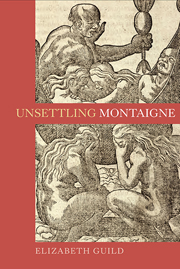Book contents
- Frontmatter
- Contents
- Acknowledgements
- Author's Note
- Abbreviations of Journal Titles
- Chronology
- Introduction
- 1 The Possibility of Their Being Otherwise
- 2 ‘Je ne vois le tout de rien’: The Cannibal and the Place of Knowledge
- 3 Cannibal, Beloved: On Eating What is Good …
- 4 Confessions: The Desire for Knowledge, the Passion for Ignorance
- 5 Tickling, Shaking, Shitting
- 6 The Place of the Brother
- 7 Uncertain Futures
- Bibliography
- Index
5 - Tickling, Shaking, Shitting
Published online by Cambridge University Press: 05 April 2014
- Frontmatter
- Contents
- Acknowledgements
- Author's Note
- Abbreviations of Journal Titles
- Chronology
- Introduction
- 1 The Possibility of Their Being Otherwise
- 2 ‘Je ne vois le tout de rien’: The Cannibal and the Place of Knowledge
- 3 Cannibal, Beloved: On Eating What is Good …
- 4 Confessions: The Desire for Knowledge, the Passion for Ignorance
- 5 Tickling, Shaking, Shitting
- 6 The Place of the Brother
- 7 Uncertain Futures
- Bibliography
- Index
Summary
We only exist through the others who make up the storehouse of the mind: models in our first tentative steps towards identity, objects of our desires, helpers and foes. The mind is a palimpsest in which the traces of these three figures will jostle and rearrange themselves for evermore.
This chapter explores the psychic economy of doubtful thinking and of the self and the self in the world, a self which is narcissistic, although as much a subject of doubt as everything else: Montaigne is ‘autant doubteux de moy que de toute autre chose’ (as doubtful of myself as of all other things) (p. 634). Doubt may be a condition and principle of thinking, both desirable and creative; it may also be troubling, hindering thinking; and, both troubling and creative, it may unsettle self-regard. At its most troubling in his text, ‘cette extremité de doubte qui se secoue soy-mesme’ (doubt at its extremes, which shakes itself up) (p. 503) is on the ‘limites et dernieres clotures’ (limits or edges) (p. 588) of intellectual and psychic sustainability; or is in the internal limits represented as a ‘pli sans nostre sçeu’ (a fold of which we have no knowledge) (p. 633), that is, aspects of self that are not known or even knowable. And this combination of doubt, limit or extremity, and shaking pulls away from tranquil doubting, or the tranquillity to be achieved by accepting doubt in preference to certitude.
- Type
- Chapter
- Information
- Unsettling MontaignePoetics, Ethics and Affect in the Essais and Other Writings, pp. 152 - 202Publisher: Boydell & BrewerPrint publication year: 2014



